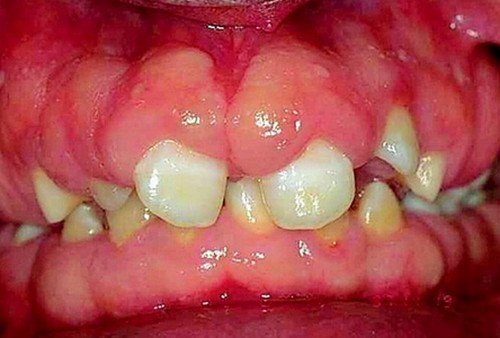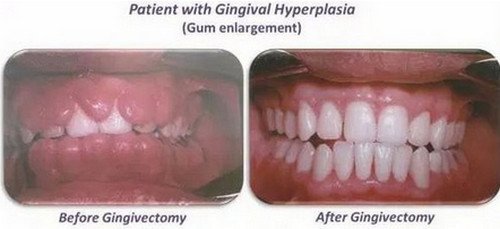Gingival Hyperplasia
What is Gingival hyperplasia ?
It is an abnormal growth of the gingival tissues. It can be caused by various reasons. To come up with proper care and treatment, the root cause of the problem should be established. (1)
Symptoms
- There is a noticeable inflammation and tenderness in the affected area.
- There is a possibility of gum bleeding.
- Plaques are built on the teeth causing them to push into the gums.
- In severe cases, the gum overgrows leading the gums to cover the teeth.
- The gums are swollen and firm to touch.
- The commonly affected areas are the labial gingival mucosa and interdental spaces. (2, 3, 6)
Gingival Enlargement Classification
- Localized – The symptom is limited to the gingiva in relation to a tooth or group of teeth.
- Generalized – It involves the gingiva throughout the mouth.
- Marginal – The problem is only limited to the margin of the gingiva.
- Diffuse – The problem includes the margin of the gingiva as well as the gingival mucosa and mucobuccal fold. (4, 5, 6)

Image 1: An image of a patient suffering from severe form of gingival hyperplasia
Picture Source: mddk.com

Image 2: A before and after image of a patient with gingival hyperplasia who underwent gingivectomy
Picture Source: ehealthhall.com
Causes of gingival hyperplasia
- Drug induced gingival hyperplasia – Some medications can cause gingival hyperplasia. The gum tissues are firm, pale pink in color, and non-tender. The tissues do not bleed that easily. In severe cases, the gingiva can entirely cover the crown of the teeth, which leads to periodontal disease. It can also lead to tooth eruption and problems in the alignment of the teeth. For the condition to subside, the drug causing gingival hyperplasia should be stopped. Examples of drug inducing gingival hyperplasia are calcium channel blocker like nifedipine (cardiovascular drug), phenytoin (anticonvulsant drug), and cyclosporine (immunosuppressant drug). (6, 10)
- Hereditary gingival fibromatosis – It is a rare condition that usually develops during childhood. It is characterized by slow growing enlargement of the gingiva. The gingiva is pale pink, firm, and non-tender. In some cases, the symptoms are not obvious until the patient reaches adulthood.
- Systemic cause – Some systemic and physical conditions can cause localized and generalized enlargement of the gingiva. Examples are hormonal imbalances, pregnancy, and leukemia.
What you should do if your gums are enlarged?
If you notice that your gums are more than their usual size, then the best thing to do is to set an appointment with your dentist. This is to thoroughly evaluate the condition of your teeth and gums. The dentist will conduct a thorough dental check-up and will take out your past medical history to detect any previous conditions that can trigger gingival hyperplasia.
In severe cases, blood work and biopsy are needed to find out the root cause of the enlargement of the gingiva. Is gingival hyperplasia contagious? Fortunately, it is not a contagious disease. You cannot acquire it from anyone else and you cannot pass it to someone else. (5, 8, 9)
What are the consequences of gingival hyperplasia?
Enlargement of the gingiva can be very unsightly. Nobody wants to have protruding gums. The primary issue is aesthetic, but along with enlargement of the gums comes other problems such as inflammation and bleeding. If the condition is not treated right away, the surrounding structures will be severely affected, especially the teeth and the bones.
An enlarged gingiva can trap tartar, bacteria, and other substances that can irritate the gum tissues. It can accelerate tooth decay and can cause further irritation, swelling, and infection. (5, 8, 9)
Diagnosis and Treatment
It is important to come up with proper diagnosis. If the doctor is suspecting a pathologic condition, a biopsy should be ordered. If it came out to be gingival inflammation, the doctor will do the best he can to improve the oral hygiene of the patient.
A periodontal therapy is all that it takes to correct the problem. If the enlargement of the gingiva is caused by medication, the doctor will stop the administration of the drugs and change it to something that will limit the growth of the gingiva. Additional treatment might be needed to totally reverse the overgrowth of gingiva. (4, 5)
Surgical approach
If the enlargement of the gingiva is not managed using conservative approach, the best option is to surgically remove it. The overgrowth is removed using a scalpel or laser. The surgery may need to be performed numerous times, especially if the enlargement of the gingiva recurs.
A pressure device that looks like a mouth guard can also be used at night to somehow limit the growth of tissues. The patient is strongly advised to visit the dentist regularly to prevent further infection and limit the effect of inflammation on the soft tissues.
For moderate to severe enlargement of the gingiva, a procedure called gingivectomy with carbon dioxide is done. This is helpful, especially if the gingival hyperplasia does not resolve despite stopping the use of medication that causes it. A short course of antibiotic as well as proper oral hygiene do help in improving the condition of the patient.
For drug induced gingiva hyperplasia, a diode laser can help. A low level laser therapy is also helpful in the adjuvant management of gingival hyperplasia. (3, 6, 7)
How to reduce the severity of gingival hyperplasia?
- It is important to practice a good oral hygiene on a day to day basis to significantly reduce the possibility of developing gingival hyperplasia.
- The patient should undergo frequent professional cleaning and be taught on various ways to improve brushing techniques.
- For drug induced gingival hyperplasia, the doctor will change the drug so as to significantly reduce the risk of gingival hyperplasia.
- If the enlargement of the gingiva is caused by systemic condition, the underlying cause should be treated.
Gingival hyperplasia is something that should be corrected as soon as you notice it. It is not only distracting to the eyes of the people who see it, but it can also affect your self-esteem, confidence, and health as a whole. Consult your doctor right away to correct the problem while it is still in its early stage. (5, 7, 8)
References:
- ttps://gbpdental.com
- https://en.wikipedia.org
- emedicine.medscape.com
- mddk.com
- www.dermnetnz.org
- www.medicinenet.com
- www.webmd.com
- www.nature.com
- www.pharmacytimes.com
- Drug Induced Gingival Enlargement: A review By Rajesh Hosadurga